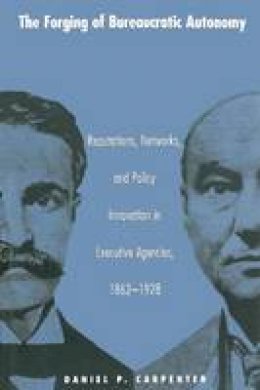
Stock image for illustration purposes only - book cover, edition or condition may vary.
The Forging of Bureaucratic Autonomy: Reputations, Networks, and Policy Innovation in Executive Agencies, 1862-1928
Daniel Carpenter
€ 79.18
FREE Delivery in Ireland
Description for The Forging of Bureaucratic Autonomy: Reputations, Networks, and Policy Innovation in Executive Agencies, 1862-1928
Paperback. Politicians have traditionally devoted little attention to the origins of American bureaucracy and its relationship between bureaucratic and interest group activities. This work presents a study of bureaucratic autonomy in democratic regimes. Series: Princeton Studies in American Politics: Historical, International and Comparative Perspectives. Num Pages: 504 pages, 12 line illus., 15 tables. BIC Classification: 1KBB; 3JH; 3JJ; HBT; JPHV; JPQ. Category: (P) Professional & Vocational; (U) Tertiary Education (US: College). Dimension: 236 x 161 x 29. Weight in Grams: 818.
Until now political scientists have devoted little attention to the origins of American bureaucracy and the relationship between bureaucratic and interest group politics. In this pioneering book, Daniel Carpenter contributes to our understanding of institutions by presenting a unified study of bureaucratic autonomy in democratic regimes. He focuses on the emergence of bureaucratic policy innovation in the United States during the Progressive Era, asking why the Post Office Department and the Department of Agriculture became politically independent authors of new policy and why the Interior Department did not. To explain these developments, Carpenter offers a new theory of bureaucratic autonomy grounded in organization theory, rational choice models, and network concepts. According to the author, bureaucracies with unique goals achieve autonomy when their middle-level officials establish reputations among diverse coalitions for effectively providing unique services. These coalitions enable agencies to resist political control and make it costly for politicians to ignore the agencies' ideas. Carpenter assesses his argument through a highly innovative combination of historical narratives, statistical analyses, counterfactuals, and carefully structured policy comparisons. Along the way, he reinterprets the rise of national food and drug regulation, Comstockery and the Progressive anti-vice movement, the emergence of American conservation policy, the ascent of the farm lobby, the creation of postal savings banks and free rural mail delivery, and even the congressional Cannon Revolt of 1910.
Product Details
Publisher
Princeton University Press United States
Number of pages
504
Format
Paperback
Publication date
2001
Series
Princeton Studies in American Politics: Historical, International and Comparative Perspectives
Condition
New
Number of Pages
504
Place of Publication
New Jersey, United States
ISBN
9780691070100
SKU
V9780691070100
Shipping Time
Usually ships in 7 to 11 working days
Ref
99-1
About Daniel Carpenter
Daniel P. Carpenter is Assistant Professor of Political Science at the University of Michigan. He has also taught at Princeton University and the University of Chicago. This book is based upon his dissertation, which won the 1998 Harold Lasswell Award of the American Political Science Association, and includes a chapter that won the 1995 Herbert Kaufman Award of the AP5A.
Reviews for The Forging of Bureaucratic Autonomy: Reputations, Networks, and Policy Innovation in Executive Agencies, 1862-1928
Winner of the Levine Memorial Book Prize Winner of the Gladys M. Kammerer Award Carpenter's book is intellectually arresting
weaving quantitative and qualitative empiricism through an impressive array of theoretical propositions toward an attractive theory of bureaucratic autonomy in the administrative state ... [A]dmirably successful in adding to our narrative of the development of the American administrative state.
Anthony Bertelli, Public Administration Review
weaving quantitative and qualitative empiricism through an impressive array of theoretical propositions toward an attractive theory of bureaucratic autonomy in the administrative state ... [A]dmirably successful in adding to our narrative of the development of the American administrative state.
Anthony Bertelli, Public Administration Review
